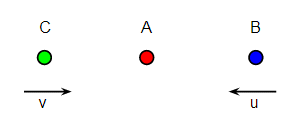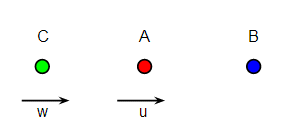Suppose there are two observers $A$ & $B$ both are in motion, now $A$ sees $B$ is moving with speed $'u'$. A says that another object $'d'$ is moving with speed $c+u$ w.r.t. A in the same direction as $B$. What stops him from saying this ?
The formula $\frac {u+v}{1+\frac{uv}{c^2}}$ is such that $'v'$ is speed of the object $'d'$ w.r.t.$ B$ and not $A.$ and $u$ is the speed of $B$ w.r.t. $A$, now even though $B$ also sees that the object $'d'$ moves faster than the speed of light. He can still always see light to travel with the speed of light and also he can be an inertial observer?
What is the problem here?


